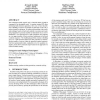Free Online Productivity Tools
i2Speak
i2Symbol
i2OCR
iTex2Img
iWeb2Print
iWeb2Shot
i2Type
iPdf2Split
iPdf2Merge
i2Bopomofo
i2Arabic
i2Style
i2Image
i2PDF
iLatex2Rtf
Sci2ools
ISSTA
2006
ACM
2006
ACM
Path-oriented random testing
Test campaigns usually require only a restricted subset of paths in a program to be thoroughly tested. As random testing (RT) offers interesting fault-detection capacities at low cost, we face the problem of building a sequence of random test data that execute only a subset of paths in a program. We address this problem with an original technique based on backward symbolic execution and constraint propagation to generate random test data based on an uniform distribution. Our approach derives path conditions and computes an over-approximation of their associated subdomain to find such a uniform sequence. The challenging problem consists in building efficiently a path-oriented random test data generator by minimizing the number of rejects within the generated random sequence. Our first experimental results, conducted over a few academic examples, clearly show a dramatic improvement of our approach over classical random testing. Categories and Subject Descriptors D.2.5 [Software Engin...
Related Content
| Added | 14 Jun 2010 |
| Updated | 14 Jun 2010 |
| Type | Conference |
| Year | 2006 |
| Where | ISSTA |
| Authors | Arnaud Gotlieb, Matthieu Petit |
Comments (0)

